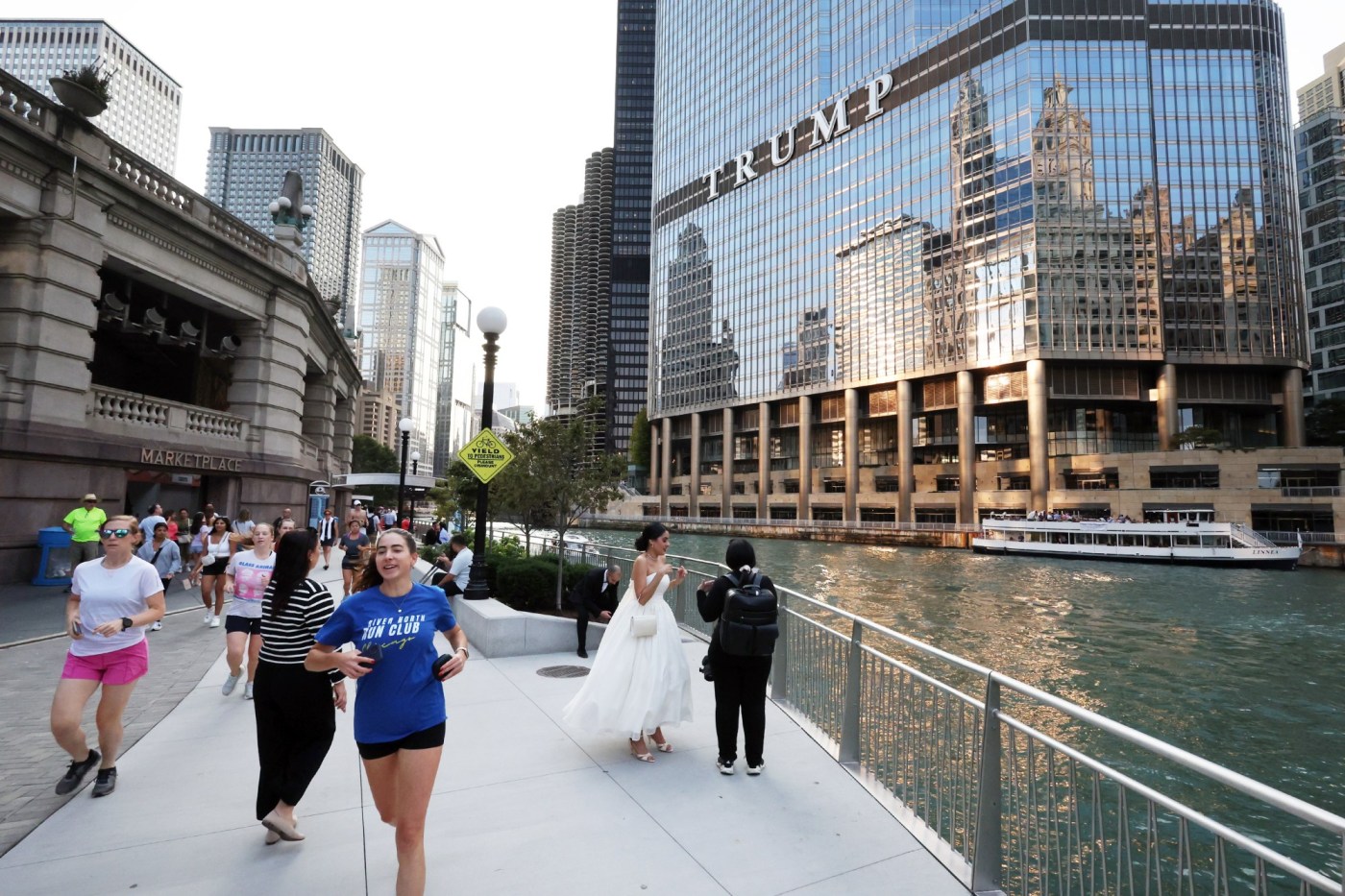
Court finds Trump Tower violated environmental laws and endangered fish in the Chicago River
After several years of litigation, a Cook County judge has found operations at Trump Tower violated state and federal environmental laws that protect the fish in the Chicago River, the Illinois attorney general’s office announced Wednesday.
“The Chicago River is one of our city’s most treasured natural resources, providing opportunities for recreation and commerce,” Attorney General Kwame Raoul said in a statement. “For years, Trump Tower failed to follow state and federal regulations that protect the health of the Chicago River and the balance of critical aquatic ecosystems therein. All entities — no matter who they are — must be held accountable when they willfully disregard our laws. I am pleased with this decision, and I am committed to continuing to vigorously enforce our environmental laws.”
Cook County Circuit Judge Thaddeus L. Wilson on Monday granted summary judgment to the plaintiffs, finding Trump International Hotel & Tower at 401 N. Wabash Ave. liable on all counts. This means there will be no trial. Raoul’s office is seeking civil penalties and injunctive relief, to be determined by the court at a future hearing, which has not yet been scheduled.
“Effectively, what was found is, there’s no question that they have done all the things that they were accused of doing,” Margaret Frisbie, executive director of Friends of the Chicago River, told the Tribune.
A lawsuit filed in 2018 by then-Attorney General Lisa Madigan alleged the cooling system intake structure at Trump Tower siphoned water from the river so powerfully that it sucked in fish and trapped them against its screens, resulting in the death of thousands of aquatic organisms. Because of the system’s capability to pull in more than 20 million gallons of water from the river per day, federal law required extensive studies of its environmental impact and of fish populations in the river. The building also pumps water back into the river that is up to 35 degrees hotter.
Advocates say the Chicago River is healthier now than it has been the past 150 years. It is home to all kinds of animals, including migratory birds, beavers and turtles, as well as 80 species of fish — up from fewer than 10 in the 1970s. The system has become a natural resource for local businesses and recreation.
“As a region, we’ve spent billions of dollars to clean up the river, and the fish are really a symbol of the future and what it can be if we invest in our environment and follow the rules,” Frisbie said. “People breaking the rules sets a poor precedent, it undoes the good that has been done, it wastes taxpayer and private industry dollars and then it also makes cynics of us all, because people then really don’t believe the rules apply to them, if prominent companies can get away with things like this.”
Former President Donald Trump has previously vowed to weaken the federal Environmental Protection Agency. In his current campaign, he hasn’t presented detailed plans for the U.S. EPA but has promised to scrap two major Biden administration regulations designed to reduce greenhouse gases from power plants and cars.
According to a New York Times report, if Trump wins in November, he would be better positioned to dismantle environmental and climate regulations with sympathetic judges and conservative allies.
A Tribune investigation in 2018 found that none of the other buildings holding cooling intake permits — nearly a dozen high-rises along the river — had similarly violated applicable rules. Most other downtown buildings, including many on the river, rely on different methods to keep cool, such as cooling towers connected to the public water system or an underground network of pipes that deliver chilled water from a handful of “ice batteries.”
Additionally, the 2018 lawsuit alleged that Trump Tower had failed to comply with the Illinois Environmental Protection Act and Illinois Pollution Control Board regulations. The Sierra Club and Friends of the Chicago River later joined as intervenors, alleging continuing violations of the Clean Water Act and creating a public nuisance.
An interim order was agreed to by all parties in 2018 requiring Trump Tower to report the average daily volume of heated water it discharged into the Chicago River every month. In September 2023, the attorney general amended the original lawsuit to include an expert witness discovery that the building had been underreporting the volume of heated water discharges for over a decade in its monthly reports.
The issues, however, date back almost two decades — to 2005, when construction of Trump Tower began without the necessary permit to authorize discharges into the river. After the attorney general’s office filed a complaint in 2012 saying Trump Tower was unlawfully releasing heated water into the river, the building was ordered to obtain a permit, pay a $46,000 fine and comply with environmental laws.
“Judge Wilson’s decision brings us close to the end of a six-year journey to bring justice to the wildlife for whom these laws were designed to protect and the people who enjoy this wildlife,” Frisbie said in a statement Wednesday. “The Trump Tower’s complete disregard for the rules carelessly killed countless creatures and degraded the value of the significant public investments over decades to bring about the healthy transformation of the river for people, fish, and other aquatic wildlife.”
The federal regulations at issue for Trump Tower were prompted by a Clean Water Act provision intended to help restore lakes and rivers by forcing polluters to significantly reduce their water withdrawals. Enforcement was spotty at best until a 2007 court order required the U.S. EPA to revise its regulations, which the agency concluded most users could meet either by installing cooling towers or reducing the velocity of water intakes.
In correspondence with the Tribune when Trump was president five years ago, the Trump Organization emailed a statement expressing disappointment with the ongoing lawsuit: “One can only conclude that this decision was motivated by politics.” Representatives couldn’t be immediately reached for comment Wednesday.
Frisbie said plaintiffs and river advocates represent the public view.
“The river belongs to everybody,” she said. “We have to take care of it, we have to treasure it and everybody has to respect the rules.”
The Chicago Tribune’s Michael Hawthorne contributed.


